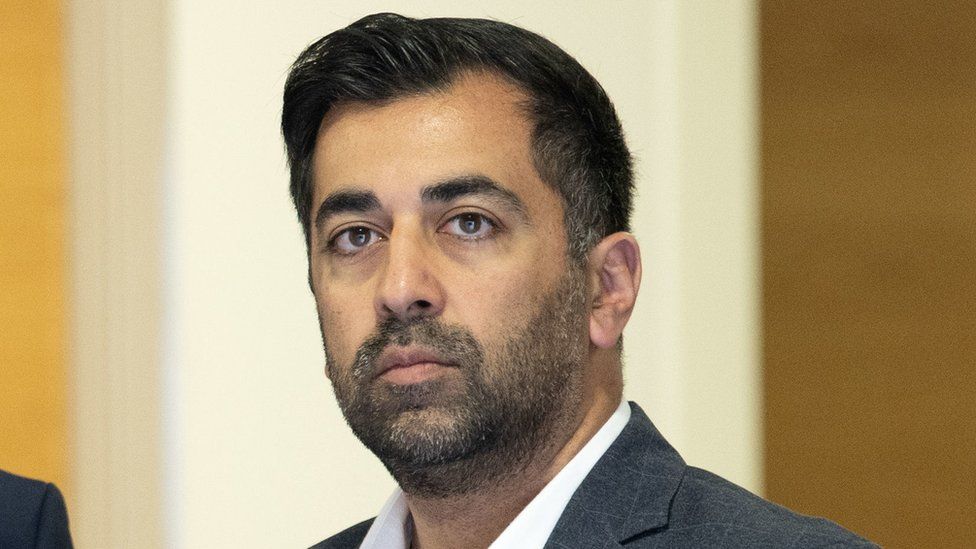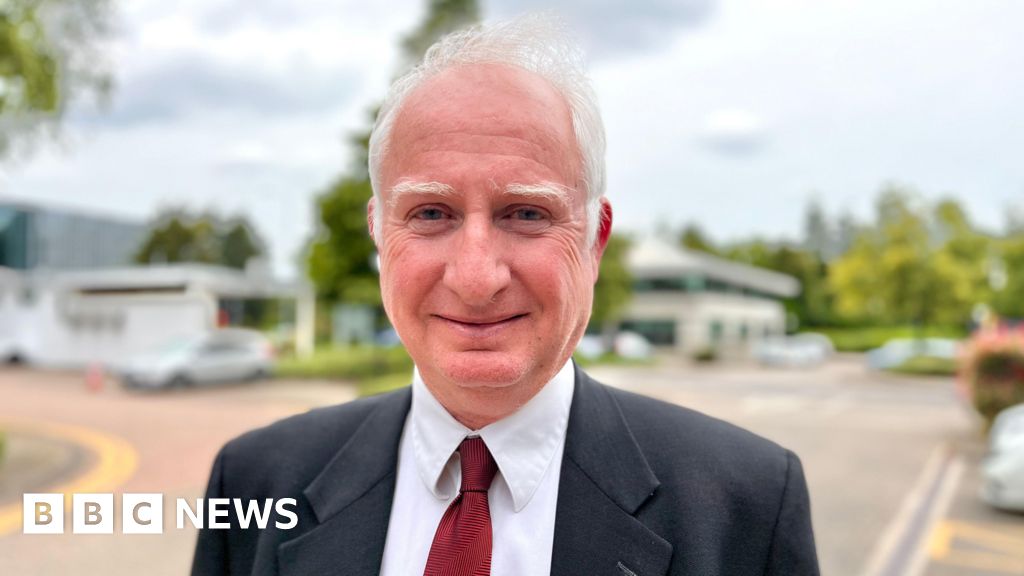ARTICLE AD BOX
 Image source, PA Media
Image source, PA Media
By Philip Sim
BBC Scotland political correspondent
It is now 100 days since Humza Yousaf was formally elected by the Scottish Parliament as the country's sixth first minister.
The SNP leader has faced a baptism of fire since then, with his predecessor Nicola Sturgeon being arrested and several of the party's key policies having to be ditched in the face of controversy.
So are the next 100 days likely to be any easier for Mr Yousaf?
There is no escaping the fact that Humza Yousaf landed his dream job at an intensely difficult moment for his party.
The mere fact of Nicola Sturgeon's rather abrupt departure had shaken the SNP.
And that was before police moved to arrest the former first minister, as well as her husband and former chief executive, and the party's treasurer for good measure.
All three were released without charge pending further investigations, but the fact that those inquiries into the SNP's finances are continuing means a black cloud is still hanging over the party.
It was a cloud which seemed to follow Mr Yousaf around in his opening weeks as first minister.
Every time he gave a big speech or interview, it would be blown out of the news agenda by a fresh twist in the investigation.
That was a particular challenge for the man billed as the Sturgeon continuity candidate in the leadership race - which ended in an incredibly tight victory over Kate Forbes in the second round of counting.
And on the surface, he has stuck by his predecessor through what she describes as a "difficult" and "traumatic" period.
When asked if he would suspend her SNP membership while the probe continues, he refused - and volunteered that she was "the most impressive politician in Europe".
Image source, Getty Images
Image caption,Mr Yousaf defeated Ash Regan (left) and Kate Forbes to become SNP leader after a vote of party members
In one sense Mr Yousaf may have tied his political fortunes to the fate of Ms Sturgeon.
But in parliament he has also moved to slash her policy platform to ribbons, in what he terms a "fresh start for Scotland".
Legislation to set up a National Care Service has been delayed. The Deposit Return Scheme has been sent for recycling.
A ban on alcohol advertising has been scotched; Highly Protected Marine Areas have sunk beneath the waves.
In quite a few of these cases, Mr Yousaf may have been left with little choice.
Questions abounded over how the care service would work and be paid for; the recycling plans were beset with issues including a stand-off with the UK government.
The no-fishing zones had prompted a backbench rebellion spearheaded by Ms Forbes and former minister Fergus Ewing, who acted out the fury of coastal communities by shredding a consultation document in the chamber.
But Mr Yousaf will also feel he has acted decisively to rip up the more controversial items left in his in-tray by Ms Sturgeon.
Comprehensive changes have been made to the government's agenda in a short space of time.
He has also moved to reset a number of relationships with groups which felt neglected by the previous administration.
The first was with business groups, in part via the reboot on alcohol advertising and recycling. There is talk of reforming business rates, and a "new deal" with the private sector.
He also signed a new pact with local government which is known as the Verity House Agreement.
Although there is always furious spin around the figures, councils have borne the brunt of budget cuts in recent years.
Mr Yousaf has promised a new "fiscal framework" between town halls and the administration in Edinburgh, along with "improved engagement on budgetary matters".
Fine words - but they will need to be backed up with hard cash if that relationship is to truly improve.
Image source, PA Media
Image caption,Humza Yousaf brought a range of new faces into his cabinet - but also retained some Sturgeon loyalists
Has Mr Yousaf also reset relations between the SNP and its leadership?
He has certainly tried to run his government out of a bigger tent.
Ms Sturgeon was famous for keeping a very tight circle of advisors who micromanaged most aspects of policy.
Mr Yousaf meanwhile has actively sought to push decisions and responsibility out to his ministers.
His initial policy prospectus featured each cabinet secretary outlining their goals and duties in their own words, introduced with the words "I commit that by 2026, I will have..."
That may give them more autonomy to make decisions to deliver on these targets, but on the flip side it likely means they will have to carry the can for any issues in their portfolio.
The departure of several of Ms Sturgeon's top team from government means there is now an assortment of big names with big views on the back benches - which range along a spectrum of loyalty.
The likes of John Swinney can be relied upon for unswerving support, while Fergus Ewing has ranged off into almost outright rebellion.
MSPs with views differing from those of the leadership tended to be quite shy about airing them publicly when Ms Sturgeon was in charge, but that is no longer the case.
Image source, PA Media
Image caption,Humza Yousaf has taken part in a number of "day of action" door-knocking sessions
A broader debate over the SNP's core policy - independence - has also flourished under Mr Yousaf.
He has sought to establish himself as the "first activist", getting out on the doorsteps regularly - but he also carried responsibility for setting the course of the main pro-independence party.
Ms Sturgeon generally sought to keep the membership marching along to the beat of a strategy she herself had drawn up.
By contrast, Mr Yousaf's big speech to the SNP's independence convention last month instead embraced just about every possible plan.
There are elements within the party which variously favour a gradual build up of support; continued efforts to secure a referendum; forcing the issue via an election result; and doubling down on public events like marches.
Mr Yousaf's approach is to encourage all of them. Perhaps that will serve to keep them all happy for now, but he may need to swing firmly behind one particular strategy come the party's autumn conference - which unlike the convention is a decision-making event where members get a vote.
Ms Sturgeon kept the SNP together as an election-winning machine by corralling pro-independence figures from right across the political spectrum behind one tightly-controlled central vision.
It remains to be seen whether her successor's more relaxed approach encourages healthy debate - or furious infighting.
Image source, HUMZA YOUSAF VIA TWITTER
Image caption,Humza Yousaf has cemented the SNP's relationship in government with the Greens
Looking ahead, one thing Mr Yousaf has retained from the Sturgeon era is her deal with the Greens.
That was underlined when he stood up in the chamber to defend Green minister Lorna Slater from a confidence vote tabled by the Tories.
That may have helped smooth over the fact that several totems of the Bute House Agreement - like HMPAs - have been ditched.
The Greens will also hope to wield influence from within the big tent as Mr Yousaf draws up his own policy plans.
He will spend the summer recess preparing his own Programme for Government - the things he is actually doing, rather than cancelling.
However, budgets remain tight. New finance secretary Shona Robison has already warned of a £1bn shortfall next year, and that could double within four years.
So he may need to be pragmatic and cut his cloth. There is already talk of a retreat from "universalism", in particular when it comes to free school meals in secondary schools.
Beyond that, a September court date has been set for the first round of the showdown with the UK government over their move to block Holyrood's gender reforms.
Whoever loses will likely appeal to the Inner House, and eventually to the Supreme Court, so an issue which the government had hoped to put to bed by passing reforms could well follow Mr Yousaf right up to the next set of elections.
And there is the small matter of that SNP conference, where Mr Yousaf has promised to bring forward the results of a party governance review as well as a finalised independence strategy.

 1 year ago
44
1 year ago
44








 English (US)
English (US)